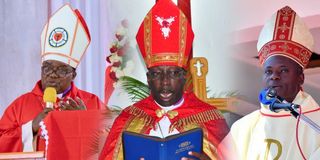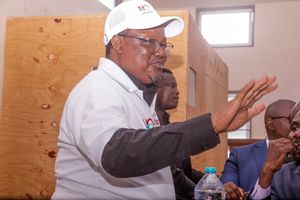Clergymen push for reforms, justice, peace ahead of 2025 elections

What you need to know:
- The messages were delivered ahead of Easter Sunday, when Tanzanian Christians will join fellow believers globally in marking the resurrection of their Lord Jesus Christ over 2,000 years ago.
Dar es Salaam. As Tanzania prepares for the 2025 General Election, clergymen used their Good Friday sermons to raise powerful concerns on the need for electoral reforms, unity, and peace ahead of this year’s general election.
Religious leaders from various denominations also called on the government to heed citizens’ concerns regarding the independence of the electoral commission.
The messages were delivered ahead of Easter Sunday, when Tanzanian Christians will join fellow believers globally in marking the resurrection of their Lord Jesus Christ over 2,000 years ago.
Clerics from different denominations, including the Evangelical Lutheran Church in Morogoro, the Catholic Church in Tabora, and Pentecostal churches in Arusha, conveyed the messages during their mass held on Friday, April 18, 2025.
The recurring themes were justice, tolerance, honest leadership, and a national desire for a true independent electoral system.
Leader of the Evangelical Lutheran Church (Morogoro Diocese), Bishop Jacob Mameo, led the call urging the government to revisit public complaints regarding the Independent Electoral Commission.
“Elections are meant to provide people the freedom to choose the leaders they want,” said Bishop Mameo during a national Good Friday sermon held in Ifakara, Morogoro Region.
“But what is happening today suggests that we no longer compare ideas; rather, we are now throwing shoes at each other,” he added.
He emphasised that the cry for a truly independent commission was not new, “This is not just about the upcoming election—it’s been an ongoing concern for years. People have lost trust in the fairness of elections. It’s time the authorities listened,” he said.
Bishop Mameo warned that dividing the nation through biased systems weakens its unity and strength: “Leadership should not divide us—it should bring us together.”
“No Reforms, No Election”
Bishop Mameo also commented on the ongoing Chadema’s No Reforms, No Election campaign, revealing that even some ruling party members silently share the same view but fear expressing it publicly.
“Sometimes the very issues that opposition parties raise originate from within the ruling party itself. Let us ask ourselves: those of us within the ruling party who see these problems, where are we headed? What do we want?” he questioned.
In a strong message against the arrest of dissenting voices, Bishop Mameo said, “Arresting people does not silence the voice of the people. It only deepens division.”
He added, “When you arrest someone, you give them a title. But if you ignore them and stand firm on principles, eventually they’ll move on.”
While urging reform, the bishop also called for balance. “Sometimes we focus only on criticising, forgetting to appreciate the progress made,” said Bishop Mameo, adding, “Our country has come a long way. As we demand change, let’s also recognise the good things made.”
He reminded Tanzanians that no leader is perfect. “There will never be an angel who can do everything. Let’s be constructive when we speak.”
The Deputy Chairperson of the Pentecostal Churches of Tanzania (CPCT), Bishop Ayoub Muna, preaching in Arusha, echoed the call for peace.
He urged political tolerance, saying, “Let’s not use excessive force on those holding different opinions. Tolerance is key to protecting our peace.”
He compared political pressure to fighting a mosquito with a club. “You’ll break your TV. Don’t pour petrol where there’s already fire. We need less power and more wisdom.”
In Tabora, Cardinal Protase Rugambwa encouraged “clean politics,” calling on worshippers to avoid insults, hate speech, and division.
“As we prepare for the elections, let us pray for our nation and stand together in love, just like Christ did,” said the Cardinal, adding, “We are one people, and peace is the foundation of everything.”
The church also took a bold stance on corruption and dishonesty in leadership, with Bishop Mameo criticizing the rise of bribery during election seasons.
“Even the church is not spared. Corruption has entered our sanctuaries. We must speak out against it,” he said.
He also condemned mysterious abductions and disappearances, urging the state to investigate such cases seriously.
“We can’t be silent when people go missing. The country must go back to its foundation of justice,” he said.
He further warned against sycophancy, calling on government officials to tell the President the truth during his public visits. “Don’t lie to the President. Speak the truth,” he said.
Bishop Mameo emphasised the need for generational leadership change: “Let’s give a chance to humble, capable, and visionary young leaders.”
“We don’t need aged politicians clinging to power. The church is urging political parties not to drag us into unnecessary conflicts,” insisted the Bishop.
Meanwhile, the Christian Council of Tanzania (CCT) Secretary General, Dr Moses Matonya, encouraged Tanzanians to register and vote.
“We chose a multi-party system, and we must use it wisely. Let’s elect patriotic leaders who love God and are ready to serve,” he said.
He called on capable Tanzanians to step forward and vie for leadership positions, but warned against vote-buying.
“Beware of people who try to win your support through bribes,” said Dr Matonya, adding, “Do not sell your vote—it is your right.”
From Ifakara to Tabora, the clergy’s messages were rooted in the Easter story—a reminder of Christ’s sacrifice for unity and peace.
“The tear of the temple curtain during Christ’s crucifixion was a symbol of reconciliation,” said Bishop Mameo, insisting, “Let us return to that spirit. Let us unite and rebuild our nation.”





